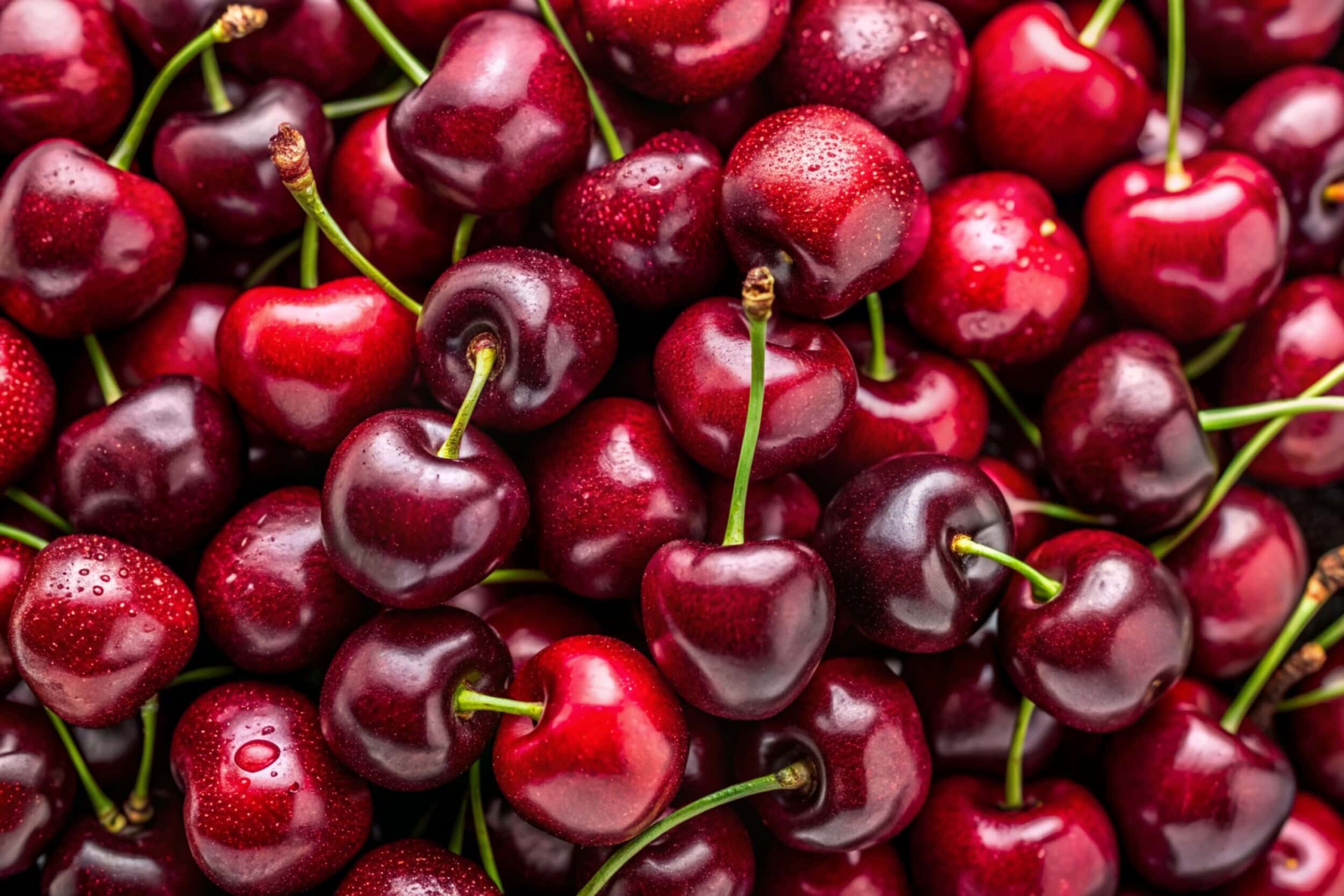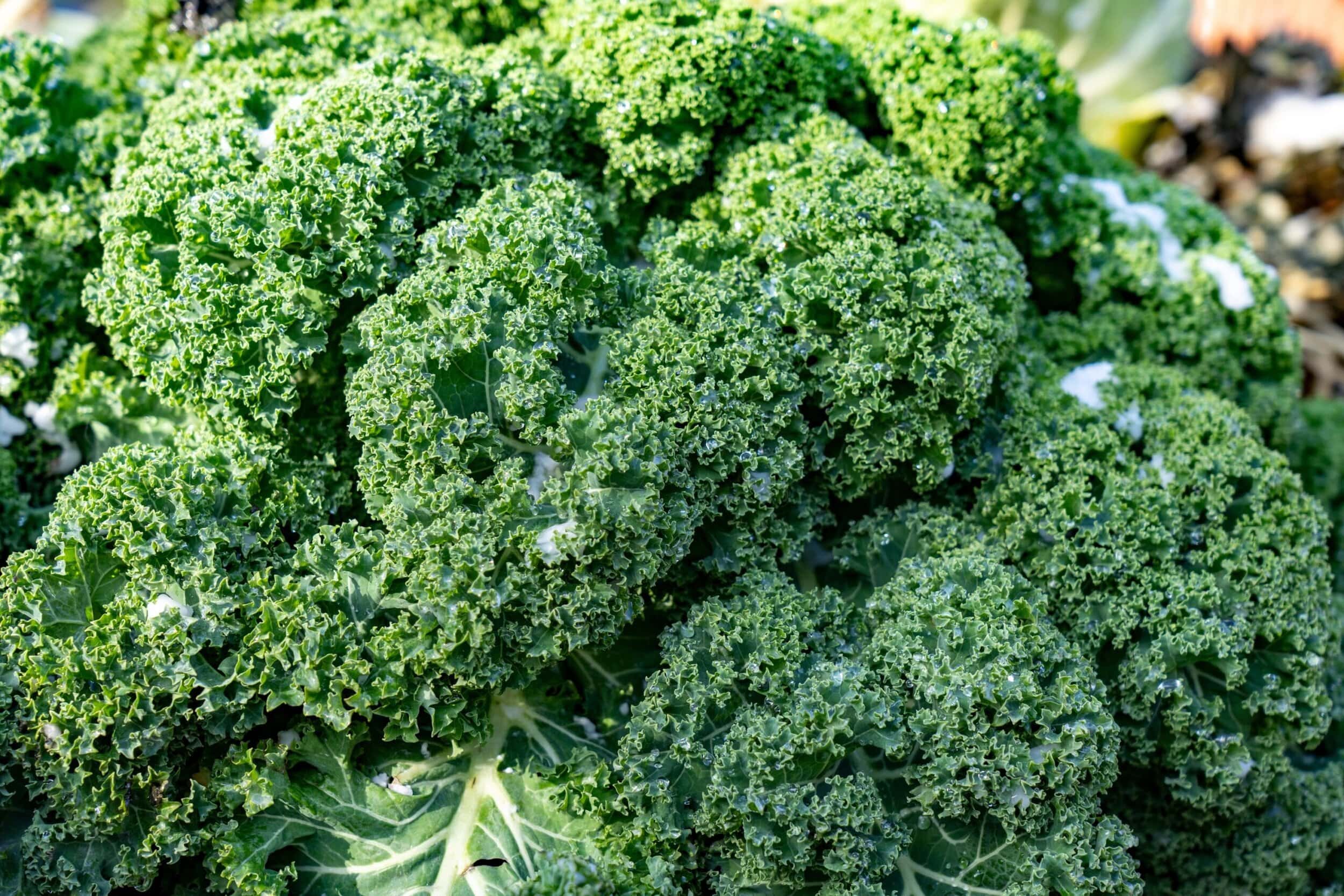Sweet cherries are more than just a summer snack—they’re a nutrient-dense fruit that can support both weight management and overall health.
A 1-cup serving (about 18–22 cherries) provides roughly 95 calories, 2 grams of fiber, and 12 grams of natural sugar, making them a low-calorie, filling option that fits easily into most meal plans.
Cherries are also rich in anthocyanins and other polyphenols—the same plant compounds found in red wine that have been linked to improved heart health, lower inflammation, and better exercise recovery. These compounds act as antioxidants, helping protect cells from oxidative stress.
This article focuses on sweet cherries, particularly Bing cherries, which are the most common variety sold fresh. We’ll also touch on tart cherries, which have been studied for their potential benefits in muscle recovery and sleep quality.
Understanding how cherries fit into your overall nutrition strategy can help you make choices that support your goals—whether you’re managing calories, improving diet quality, or simply aiming for more whole foods.
✅ Quick answer
Yes, cherries can be a helpful addition to a weight loss diet. They’re relatively low in calories and contain fiber and water, which help you feel full and satisfied. Fresh sweet cherries offer the most benefits, while processed versions like dried cherries or maraschino cherries should be limited.
🚀 How cherries can support your goals
- They’re sweet but low in calories: Cherries offer a naturally sweet, refreshing flavor for relatively few calories, about 95 per cup. They deliver the sweetness your taste buds crave, but in a nutrient-dense, portion-friendly way.
- They help you feel full and satisfied: The fiber-and-water combo in cherries helps you feel fuller for longer, slowing digestion and steadying blood sugar. That means fewer snack cravings between meals and more control over your appetite, both key to building consistency in a weight-loss plan. Pairing cherries with protein (like Greek yogurt or cottage cheese) can make the effect even stronger.
- They have antioxidants that aid recovery: Thanks to their rich supply of anthocyanins, the same plant compounds that give them their deep red color, cherries have powerful anti-inflammatory effects. Research shows they may help reduce post-exercise muscle soreness, which can make it easier to stick with your workouts and stay active.
⚠️ Things to be mindful of
- Keep portions in mind: A standard serving is about 1 cup (150 g, or roughly 18–22 cherries). Taking a moment to portion out your serving helps you stay present while eating and enjoy them more mindfully (yes, even if you go back for a few more).
- Limit processed cherry products: Dried cherries, cherry juice, and maraschino cherries might look similar to the real thing, but they’re not nutritional equals. These versions are often stripped of fiber and concentrated in calories, with added sugars or syrups that make it easy to overconsume. Fresh or frozen cherries give you all the flavor and nutrients—without the extra sugar hit.
- Keep your snacks balanced: Pair them with a source of protein or healthy fat, like Greek yogurt, cottage cheese, or a few almonds, to steady energy levels and keep you feeling satisfied longer. It’s less about cutting out fruit and more about how you build your meals and snacks to support your goals.
Rx weight loss, the right way, with Noom
Get access to prescription weight loss medication with Noom.🥗 Nutrients in cherries (per 100 g / about 12-15 cherries)
| Nutrient | Amount | % RDA* |
|---|---|---|
| Calories | 63 calories | 3% |
| Protein | 1.1 g | 2% |
| Total carbs | 16 g | 6% |
| Fiber | 2.1 g | 8% |
| Sugars | 12.8 g | — |
| Total fat | 0.2 g | <1% |
| – Saturated fat | <0.1 g | <1% |
| – Monounsaturated fat | <0.1 g | — |
| – Polyunsaturated fat | <0.1 g | — |
| Omega-3 | 16 mg | — |
| Omega-6 | 36 mg | — |
Foods that are high in water and fiber but low in calories (like cherries) help you feel fuller on fewer calories—a key principle behind effective, long-term weight management. A 100-gram serving of sweet cherries (about 12–15 cherries) provides just 63 calories, making them a low-energy-density food. In other words, you can enjoy a satisfying portion for relatively few calories, which helps support a sustainable calorie deficit without feeling deprived.
Most of those calories come from carbohydrates (16 g), mainly natural fruit sugars (12.8 g) balanced by 2 g of fiber. That fiber slows digestion, helping keep you full longer and preventing sharp blood sugar spikes.
Cherries are naturally low in fat and protein, which makes them ideal as a light, refreshing snack or as part of a balanced meal. Pairing them with a protein source, like Greek yogurt, cottage cheese, or nuts, can make them even more satiating.
*Recommended dietary allowance (RDA) is defined as the average daily amount of nutrients needed to meet the requirements of nearly all healthy people in a specific group.
💊 Vitamins & minerals in cherries (per 100 g / about 12-15 cherries)
| Vitamin/Mineral | Amount | |
|---|---|---|
| Vitamin C | 7 mg | 8% |
| Copper | 0.06 mg | 7% |
| Potassium | 222 mg | 5% |
| Manganese | 0.07 mg | 3% |
| Vitamin B6 | 0.05 mg | 3% |
| Magnesium | 11 mg | 3% |
| Iron | 0.36 mg | 2% |
| Vitamin K | 2.1 μg | 2% |
| Phosphorus | 21 mg | 2% |
| Calcium | 13 mg | 1% |
| Vitamin A | 3 μg | <1% |
Sweet cherries may not be a powerhouse of any single nutrient, but they offer a broad spectrum of vitamins and minerals that support overall health. Their most notable nutrients include vitamin C, which aids immune function, collagen production, and skin health; potassium, which helps regulate fluid balance and blood pressure; and copper, which plays a key role in energy production and iron absorption. While the amounts are modest, these nutrients work together to support daily wellness and recovery, making cherries a delicious, nutrient-dense addition to a balanced diet.
🔍 Nutrient breakdown
Glycemic index (GI) of cherries
Glycemic index: 22 (Low)
💡 Tip: Cherries have a low glycemic index, meaning they cause a slower, more gradual rise in blood sugar compared to high-GI foods. This helps prevent energy crashes and keeps hunger at bay longer, making them a smart choice for steady energy throughout the day.
Are cherries high in protein?
❌ No: Sweet cherries contain 1.1 g of protein per serving.
💡 Better protein alternatives: Greek yogurt | Cottage cheese | Almonds
Are cherries high in fiber?
❌ No: Sweet cherries have 2.1 g of fiber per serving.
💡 Tip: While cherries do contain some fiber, they’re not a high-fiber food. To boost your fiber intake, pair cherries with fiber-rich foods like chia seeds, oats, or raspberries, or enjoy them alongside a handful of nuts for added satiety.
Are cherries low in carbs?
❌ No: Sweet cherries have 16 g of carbs per serving.
💡 Tip: Cherries are a moderate-carb fruit, which means they can fit into most balanced diets but may need to be limited on very low-carb or ketogenic plans. The natural sugars provide quick energy, making them a great pre- or post-workout snack, but portion control is important for those watching carb intake.
Are cherries gluten-free?
✔️ Yes: Fresh cherries are naturally gluten-free and safe for those with celiac disease or gluten sensitivity. However, always check labels on processed cherry products like dried cherries or cherry-flavored items, as these may contain gluten-containing additives.
Are cherries good for fat loss?
Maybe: Cherries can support fat loss when eaten as part of a calorie-controlled diet. Their low calorie density and fiber content help manage hunger and reduce overall calorie intake. However, they’re not a magic fat-burning food—sustainable fat loss comes from creating a consistent calorie deficit through a balanced diet and regular physical activity.
🍽️ Diet compatibility: Which diets include cherries?
| Diet | ✅ / ❌ | Why |
|---|---|---|
| Keto | ❌ No | Too high in carbs (16 g per 100 g) for strict keto limits. |
| Paleo | ✅ Yes | Whole, unprocessed fruit that fits Paleo principles. |
| Mediterranean | ✅ Yes | Aligns with the diet’s focus on seasonal, antioxidant-rich foods. |
| Vegan | ✅ Yes | 100% plant-based, nutrient-dense, and sustainable. |
| Gluten-free | ✅ Yes | Naturally gluten-free; just avoid processed cherry products. |
Sweet cherries fit easily into most eating styles, except very low-carb plans like keto. They’re a naturally nutritious choice for whole-food diets such as Paleo and Mediterranean, and work perfectly for vegan and gluten-free lifestyles. With their natural sweetness and antioxidant benefits, cherries make a simple, satisfying addition to almost any balanced eating plan.
🌟 Are cherries healthy? What are the health benefits
Metabolic health: Are cherries good for your metabolism?
- Boosts metabolism? Neutral – Cherries don’t directly boost your metabolic rate. However, their polyphenols and antioxidants may support overall metabolic health by reducing inflammation and oxidative stress, both of which can interfere with efficient metabolism. They’re not a metabolism booster, but they create a healthier environment for your body to function optimally.
- Improves insulin sensitivity? Maybe – Some research suggests that the anthocyanins in cherries may help improve insulin sensitivity and glucose metabolism, which is beneficial for blood sugar control. While the evidence is promising, more human studies are needed to confirm this effect definitively. Including cherries as part of a balanced diet rich in whole foods can support healthy blood sugar levels.
- Effect on fat storage? Positive – The anti-inflammatory compounds in cherries may help reduce belly fat accumulation and improve metabolic markers. Animal studies have shown that cherry consumption is associated with reduced abdominal fat and improved fat metabolism. While human studies are more limited, the existing evidence is encouraging for those looking to manage body composition.
Cholesterol impact: Do cherries affect cholesterol levels?
- Does it lower LDL (bad) cholesterol? ✔️ Yes – Research suggests that regular cherry consumption can help lower LDL cholesterol levels. The anthocyanins and fiber in cherries work together to reduce cholesterol absorption in the gut and decrease oxidative damage to LDL particles, which is a key factor in heart disease development.
- Does it raise HDL (good) cholesterol? ❌ No – There is currently not enough strong evidence to suggest that cherries significantly raise HDL (“good”) cholesterol. Research in this area is ongoing, but the primary cardiovascular benefits seem to be linked to lowering LDL and inflammation.
- Overall impact on heart health? Cherries have a favorable overall impact on heart health. Thanks to their high potassium content, anti-inflammatory effects, and potential to lower LDL cholesterol, they help regulate blood pressure and reduce oxidative stress, both of which are key risk factors for heart disease.
💡 Tip: Incorporate cherries into a heart-healthy diet rich in oats, nuts, and leafy greens for synergistic benefits.
Can I eat cherries for a calorie deficit?
✔️ Yes, with confidence: Cherries are an excellent choice for a calorie deficit due to their low-calorie density and high water content. A full cup provides a satisfyingly sweet snack for under 100 calories, helping to manage hunger without overconsuming energy. They are a much smarter choice than processed sweets or high-calorie snacks.
💡 Tip: Use a measuring cup to portion out your cherries to ensure you’re staying within your daily calorie goals.
Are cherries rich in antioxidants?
✔️ Yes: Cherries are loaded with powerful antioxidants, particularly anthocyanins and quercetin. Anthocyanins, which give cherries their deep red color, help fight cellular damage caused by free radicals and reduce inflammation throughout the body. These compounds are linked to a lower risk of several chronic diseases.
💡 Tip: The darker the cherry, the higher the concentration of beneficial anthocyanins.
Do cherries support gut health?
✔️ Yes: The dietary fiber in cherries acts as a prebiotic, feeding the beneficial bacteria in your gut. A healthy gut microbiome is essential for proper digestion, immune function, and even mood regulation. While cherries aren’t the highest-fiber fruit, they still contribute to your daily fiber needs and support a thriving gut environment.
Do cherries support digestion?
Positive: The combination of fiber and water in cherries helps promote regular bowel movements and prevent constipation. This keeps your digestive system running smoothly. However, for some people, particularly those with IBS, the natural sugars (fructans and sorbitol) in cherries can cause gas or bloating if eaten in large quantities. It’s best to start with a small portion to see how your body reacts.
💡 Tip: Eat cherries on their own rather than after a heavy meal to minimize the potential for digestive discomfort.
Do cherries help you feel satiated and less hungry?
💡 Satiety Level: Moderate
The fiber and water content in cherries help you feel full on fewer calories. This combination fills up your stomach and slows down digestion, signaling to your brain that you are satisfied. While they’re not as filling as protein-rich or very high-fiber foods, cherries provide decent satiety for their calorie count.
💡 Tip: Pair cherries with a source of protein, like Greek yogurt, to create a highly satiating snack that keeps you full for hours.
Do cherries help with nighttime cravings?
✔️ Yes: Cherries are a natural source of melatonin, the hormone that regulates sleep-wake cycles. Having a small bowl of cherries in the evening can satisfy a sweet craving and potentially improve your sleep quality, which is crucial for hormone regulation and weight loss. Better sleep means better control over hunger hormones like ghrelin and leptin.
💡 Tip: Try drinking a small serving of cherry juice (which contains more melatonin than sweet varieties) about an hour before bed to support restful sleep and curb late-night snacking.
Do cherries help reduce inflammation?
✔️ Yes: Cherries are one of the most potent anti-inflammatory foods available. Their high concentration of anthocyanins has been shown in studies to lower key inflammatory markers in the blood, which can help reduce pain from conditions like arthritis and gout. Regular consumption may also help reduce exercise-induced inflammation and muscle soreness.
Are cherries beneficial for brain health?
✔️ Yes: The antioxidants in cherries protect brain cells from oxidative stress, which is linked to age-related cognitive decline. Regular consumption may help improve memory and cognitive function over the long term. The anti-inflammatory effects also support overall brain health by reducing chronic inflammation in neural tissue.
Can cherries improve skin and hair health?
✔️ Yes: The vitamin C in cherries is essential for collagen production, the protein that gives skin its structure and elasticity. The antioxidants also help protect the skin from UV damage and environmental stressors, contributing to a healthier complexion. While not a miracle cure, incorporating cherries into your diet can support radiant skin and strong hair from the inside out.
Can cherries help balance hormones?
✔️ Yes, with limited evidence: By improving insulin sensitivity and potentially promoting better sleep through melatonin, cherries can indirectly support hormonal balance. Quality sleep is vital for regulating hunger hormones like ghrelin and leptin, which are critical for weight control. Additionally, reduced inflammation helps support overall endocrine function.
💡 Tip: Hormonal balance is complex and influenced by many factors, including sleep, stress, nutrition, and exercise. While cherries can contribute to better hormone health, they work best as part of a holistic lifestyle approach.
🍽️ Best ways to eat cherries for weight loss
- Fresh and whole – The best way to enjoy cherries is in their natural state. Eating them fresh ensures you get the maximum amount of fiber, water, vitamins, and antioxidants without any added sugars. A cup of fresh cherries makes for a perfect, satisfying snack on its own.
- Frozen or in smoothies – Frozen cherries are an excellent option, especially when fresh ones are out of season. They retain most of their nutrients and are perfect for blending into smoothies with a scoop of protein powder and spinach for a filling, nutrient-dense meal replacement.
- Avoid canned in syrup or dried – Stay away from cherries canned in heavy syrup, maraschino cherries, and most dried cherries. These products are often packed with added sugars, which dramatically increases their calorie content and negates many of their health benefits. This turns a healthy fruit into a processed, sugary treat that can hinder weight loss.
Cherry varieties: What’s the difference?
Not all cherries are created equal! Here’s a breakdown of the most popular varieties and how they compare:
| Variety | Type | Color | Flavor profile | Best use | Key nutritional notes |
|---|---|---|---|---|---|
| Bing (focus of this article) | Sweet | Deep red to almost black | Bold, sweet with slight tartness | Fresh eating, baking, and snacking | Highest anthocyanin content among sweet cherries; excellent anti-inflammatory properties |
| Rainier | Sweet | Golden-yellow with red blush | Extra sweet, delicate, creamy | Fresh eating, salads, desserts | Slightly higher sugar and calories; lower anthocyanins than Bing but still nutritious |
| Montmorency | Tart | Bright red (stays bright when processed) | Tart, sour, tangy | Juice, dried, baking, not typically eaten fresh | 20x more Vitamin A than sweet cherries; 5x higher antioxidants; much higher melatonin content |
| Lambert | Sweet | Dark red | Similar to Bing, rich flavor | Fresh eating, cooking | Comparable to Bing in nutrition and benefits |
| Balaton | Tart | Dark red-purple | Sweeter than Montmorency, less acidic | Baking, juice, fresh | Higher melatonin than most tart varieties |
- Bing cherries are the most popular sweet cherry variety in the U.S., offering the best balance of sweetness, firmness, and anthocyanin content for weight management
- Rainier cherries are sweeter but more delicate and expensive; they have slightly fewer antioxidants due to their lighter color
- Tart cherries (Montmorency) are rarely eaten fresh but excel in juice form and contain significantly more melatonin (great for sleep) and Vitamin A
- All varieties are beneficial for weight loss, but this article focuses on Bing-type sweet cherries since they’re most commonly eaten fresh
Cherries land right in the middle among popular fruits for calories and carbs—slightly higher than berries, but lower than bananas or other tropical fruits. Strawberries are the lowest in calories, raspberries lead in fiber (great for fullness), and blueberries mirror cherries in antioxidants and calorie range. Mixing up your fruit choices keeps your diet more satisfying and nutritionally balanced over time.
Frequently asked questions about cherries and weight loss
How many cherries should I eat per day for weight loss?
A: A good serving size is about 1 cup (150g or roughly 18-22 cherries), which contains around 95 calories. This provides a satisfying sweet treat without overdoing the calories or sugar. You can enjoy this amount daily as part of a balanced diet, but be mindful of your total daily calorie and carbohydrate intake.
Are tart cherries better than sweet cherries for weight loss?
A: Tart cherries (like Montmorency cherries) are slightly lower in sugar and calories than sweet cherries, and they contain higher levels of certain antioxidants and melatonin. However, both types are beneficial for weight loss when consumed in moderation. Sweet cherries are more enjoyable to eat fresh, while tart cherries are often consumed as juice or dried. Choose based on your preference and what you’ll actually enjoy eating regularly.
Can I eat cherries at night without gaining weight?
A: Yes! In fact, cherries can be a smart nighttime snack. They’re relatively low in calories and contain natural melatonin, which may help you sleep better. Better sleep supports healthy hormone levels that regulate hunger and metabolism. Just stick to a reasonable portion (about 1 cup) and count those calories as part of your daily total.
Do cherries burn belly fat?
A: No single food can specifically target belly fat. However, cherries can support overall fat loss as part of a calorie-controlled diet. Their anti-inflammatory compounds may help reduce inflammation associated with obesity, and animal studies suggest cherry consumption may help reduce abdominal fat accumulation. The key is consistent calorie deficit combined with regular exercise.
Are frozen cherries as good as fresh for weight loss?
A: Absolutely! Frozen cherries retain nearly all their nutrients and are just as beneficial for weight loss as fresh ones. They’re often more affordable and available year-round, making them a practical option. Just make sure to choose frozen cherries without added sugar or syrup. They’re perfect for smoothies or thawing for a quick snack.
Can eating too many cherries prevent weight loss?
A: Yes. While cherries are healthy, eating too many can lead to excess calorie and sugar intake, which can stall weight loss. Even natural sugars contribute to your daily carbohydrate and calorie totals. Stick to appropriate portion sizes (about 1 cup per serving) and track them as part of your overall daily intake.
Are dried cherries good for weight loss?
A: Generally, no. Dried cherries are much more calorie-dense than fresh ones because the water has been removed, concentrating the sugars. Many commercial dried cherries also have added sugar. A small handful can contain as many calories as several cups of fresh cherries. If you enjoy dried cherries, treat them more like candy—a small treat rather than a weight loss food.
🧠 The bottom line: Sweet cherries a great for weight loss
Sweet cherries are a naturally sweet, nutrient-rich addition to a balanced weight loss plan. With only about 95 calories per cup, plus fiber and water that help you feel full, they’re an easy way to satisfy sweet cravings without derailing progress. Their antioxidants and anti-inflammatory compounds support more than just weight goals—they also promote heart health, better recovery, and even improved sleep.
Fresh or frozen cherries are your best bet since they deliver all the benefits without the added sugars found in processed versions. A mindful serving—about 1 cup (12–15 cherries)—strikes the right balance between enjoyment and portion control. They’re not a magic fix, but they can be a delicious, sustainable part of your journey toward better health.
📖 Scientific evidence
- A Review of the Health Benefits of Cherries (Nutrients, 2018) – This review found that regularly eating cherries may help lower inflammation and reduce the risk of conditions like arthritis, heart disease, and diabetes, thanks to their high levels of anthocyanins—plant compounds that fight oxidative stress.
- Consumption of Bing Sweet Cherries and Inflammation (The Journal of Nutrition, 2006) – In this study, participants who ate Bing sweet cherries daily for four weeks showed lower levels of key inflammation markers in their blood, suggesting that cherries may help reduce inflammation naturally.
- Tart Cherry Juice and Sleep Quality (European Journal of Nutrition, 2012) – Drinking tart cherry juice was shown to raise natural melatonin levels and improve sleep duration and quality in healthy adults, suggesting cherries may offer a gentle, food-based way to support better rest.
- Tart Cherries and Metabolic Health (Journal of Medicinal Food, 2009) – In an animal study, rats fed tart cherry powder had less belly fat, lower cholesterol and triglycerides, and reduced inflammation compared to those on a regular diet—suggesting cherries may help support healthier metabolism.
- Sweet Cherries and Glucose Control (International Journal of Molecular Sciences, 2025) – In a 6-week study, adults who ate sweet cherries daily showed improved blood sugar and inflammation markers, suggesting regular cherry intake may support metabolic health.
- Unveiling the Health Effects of Sweet Cherry Nutrients (Nutrients, 2024) – This comprehensive review explores how sweet cherries’ bioactive compounds (like anthocyanins and flavan-3-ols) are linked to benefits in areas such as cardiovascular health, metabolism, gut health, and even sleep—making cherries a strong contender for supporting overall wellness.
Why you can trust us
At Noom, we’re committed to providing health information that’s grounded in reliable science and expert review. Our content is created with the support of qualified professionals and based on well-established research from trusted medical and scientific organizations. Learn more about the experts behind our content on our Health Expert Team page.





















 Noom Team
Noom Team
 Melissa Kay
Melissa Kay

 Shoshana Fishbein
Shoshana Fishbein
